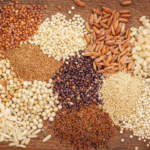
The Chamber of Agribusiness Ghana (CAG) has declared a national agricultural emergency, warning of an imminent collapse of Ghana’s grain sector as more than 1.2 million metric tonnes of rice, maize, and soya beans remain unsold across the country.
According to the Chamber, this situation represents a “paradoxical crisis of surplus amidst production deficits”, requiring urgent government intervention to stabilise the domestic grain market, protect farmers’ livelihoods, and safeguard national food security.
This is contained in a press release signed by the Chief Executive Officer of the Chamber of Agribusiness Ghana (CAG), Anthony Kofituo Morrison.
Unsold Stocks Amid Policy Gaps
Field data from CAG reveals that while Ghana continues to face production shortfalls in key commodities, large quantities of harvested grains are stranded in warehouses and factories due to market distortions, import pressures, and policy inconsistencies.
The Chamber said Ghana’s annual rice consumption stands at 1.9 million metric tonnes, with local production averaging 900,000 metric tonnes.
Despite the shortfall, nearly two years’ worth of both milled and paddy rice remain unsold, a situation worsened by smuggling and the inflow of expired rice through unapproved routes, leading to tax losses and further market disruptions.
Similarly, Ghana consumes about 3.3 million metric tonnes of maize annually against a production capacity of 2.5 million metric tonnes, while soya bean production of 225,000 to 250,000 metric tonnes represents only about a third of the country’s potential.
Export Restrictions Deepening Market Distortion
The Chamber blamed the Export and Import (Restriction on Exportation of Soya Beans) Regulations, 2020 (L.I. 2432), for aggravating the market imbalance. The regulation, introduced to secure local supply for poultry and aquaculture industries, has instead triggered a price collapse, with farmgate prices dropping from GH¢650 to GH¢400 per bag.
CAG stated that thousands of bags of soya beans remain locked up in warehouses across the Northern and Southern regions, discouraging farmers from further cultivation.
“The policy has had unintended consequences—farmers are shifting to other crops due to restricted markets and poor prices,” the Chamber said.
Immediate Measures Proposed
To address the growing crisis, CAG is calling on the government to implement a three-month moratorium on rice imports to allow local stockpiles to be cleared and create market stability for farmers and millers.
The Chamber is also demanding the immediate repeal of L.I. 2432 to restore competitive pricing, eliminate warehouse congestion, and encourage expanded soya bean cultivation.
In addition, CAG wants “the Ministry of Trade and Industry, National Security, Ghana Revenue Authority, Ghana Standards Authority, and Food and Drugs Authority to jointly conduct a comprehensive audit of rice on the market to verify tax compliance, enforce quality standards, and eliminate smuggled or expired products.”
Strategic State Intervention and Long-Term Framework
Beyond emergency measures, CAG has proposed that the government establish a Strategic Grain Reserve Procurement Programme through the National Food Buffer Stock Company (NAFCO) to purchase surplus grains at fair and sustainable prices.
The programme, the Chamber said, should serve as a price stabilisation mechanism, ensuring predictable prices for both farmers and grain-based industries. It would also enable Ghana to meet its obligations under the ECOWAS Regional Food Security Storage Strategy.
The Chamber further recommended a five-year Ghana Rice Production Strategy, led by the Ministries of Food and Agriculture and Trade and Industry, to align import quotas with rising local production capacity.
It also urged investment in research, irrigation, mechanisation, and agro-processing to enhance productivity and competitiveness.
Additionally, CAG is advocating for a comprehensive Agriculture for Economic Transformation Policy to harmonise agricultural support initiatives and drive private sector investment in value addition.
Safeguarding Farmers’ Investments
CAG emphasised that protecting local farmers and agribusinesses is essential to achieving food security and economic resilience.
“We must safeguard the investments of our local farmers and agribusinesses to build a food-secure and economically resilient Ghana.
“Decisive action on these recommendations will not only resolve the current grain glut but reposition Ghana’s grains sector as a driver of sustainable growth and national resilience.”